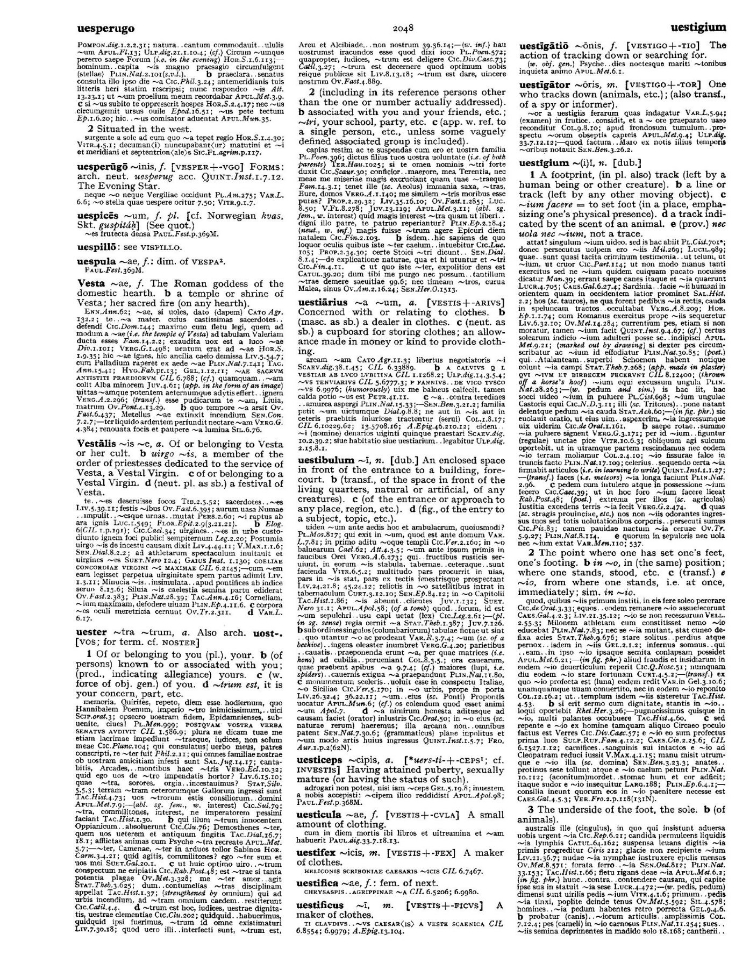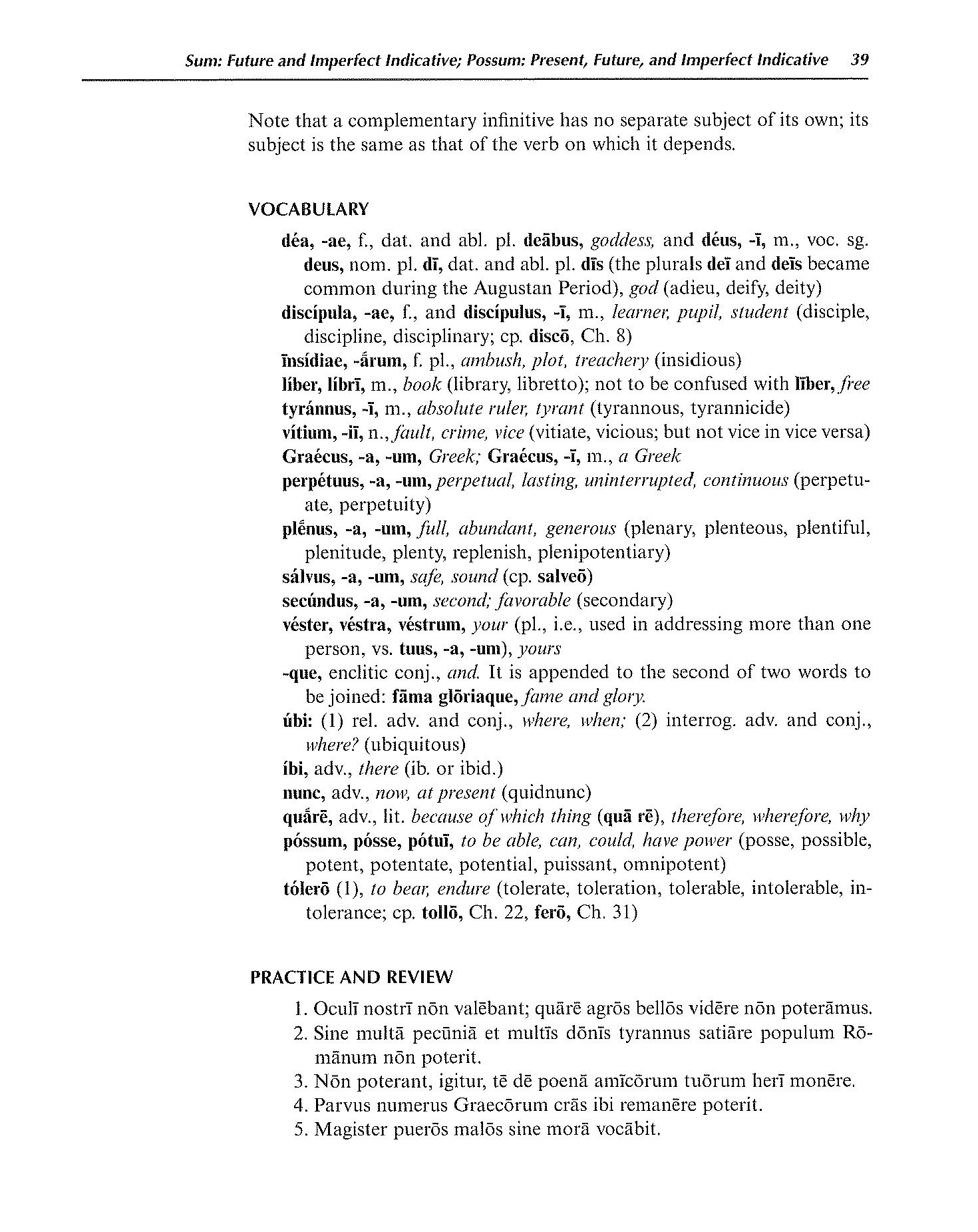
page_listing.tpl
page_subListingDetails.tpl
sub_listingDetails_style1.tpl
sub_listingDetails.title.tpl
vester, vestra, vestrum your (pl.)
vester, vestra, vestrum is a Latin Pronoun that primarily means your (pl.).
Definitions for vester, vestra, vestrum
Wheelock's Latin
Pronoun
- 1
your (pl., i.e. used in addressing more than one person).
Oxford Latin Dictionary
Pronoun
- 1
Of or belonging to you (pl.), your. (b) (of persons) known to or associated with you; (pred., indicating allegiance) yours, (c) (w. force of obj. gen.) of you. (d) it is your convern, part, etc.
- 2
(including in its reference persons other than the one or number actually addressed). (b) associated with you and your friends, etc.; your school, party, etc. (c) (app. w. ref. to a single person, etc., unless some vaguely defined associated group is included).
Sentences with vester, vestra, vestrum
Latin to English
Patria vestra erat lībera.Compare Your (pl.) country was free.
Amīcus vester erit tyrannus.Compare Your friend will be a tyrant.
Ōtium in patriā vestrā nōn potest esse perpetuum.Compare The peace in your (pl.) country cannot be perpetual.
Magister vester librōs pulchrōs semper amābat.Compare Your (pl.) teacher always used to like (liked) fine books.
Sicilia atque Africa, sine qui urbs atque Italia tueor non possum, vester fides committo.Compare He has entrusted to your fidelity Sicily and Africa, without which he cannot defend the city and Italy.
Factum vester oratio non convenio.Compare Your deeds do not agree with your speech.
Nolo ad vester lex atque institutum exigo is qui Lacedaemon fio.Compare Do not measure by your laws and institutions what is done at Lacedaemon.
Data sources
Notes
- Definitions
- Frederick M. Wheelock, Wheelock's Latin, 6th ed., rev. Richard A. LaFleur (New York, NY: HarperCollins Publishers, 2005): 39.
- P. G. W. Glare, Oxford Latin Dictionary, Vols. 1-8 (Oxford: Clarendon Press, 1982): 2048.
- Word frequencies
- Christopher Francese, "Latin Core Vocabulary," Dickinson College Commentaries, last modified 2014, http://dcc.dickinson.edu.
- Paul B. Diederich, The Frequency of Latin Words and Their Endings, PhD diss., (Columbia University, 1939).
- Louis Delatte, Suzanne Govaerts, Joseph Denooz, and Etienne Evrard, Dictionnaire fréquentiel et index inverse de la langue latine [Frequency Dictionary and Inverse Index of the Latin Language] (Liège, Belgium: Laboratoire d'analyse statistique des langues anciennes de l'Université de Liège [L.A.S.L.A.], 1981): 121.
Bibliography
Allen, Joseph H. Allen and Greenough's New Latin Grammar for Schools and Colleges: Founded on Comparative Grammar. Edited by James B. Greenough, George L. Kittredge, Albert A. Howard, and Benjamin L. D'Ooge. Boston, MA: Ginn & Company, 1903.
Crystal, David. A Dictionary of Linguistics and Phonetics. 6th ed. Oxford, UK: Blackwell Publishing, 2008.
Delatte, Louis, Suzanne Govaerts, Joseph Denooz, and Etienne Evrard. Dictionnaire fréquentiel et index inverse de la langue latine [Frequency Dictionary and Inverse Index of the Latin Language]. Liège, Belgium: Laboratoire d'analyse statistique des langues anciennes de l'Université de Liège (L.A.S.L.A.), 1981.
Diederich, Paul B. The Frequency of Latin Words and Their Endings. PhD diss., Columbia University, 1939.
Francese, Christopher. "Latin Core Vocabulary." Dickinson College Commentaries. Last modified 2014. http://dcc.dickinson.edu/latin-vocabulary-list.
Gildersleeve, Basil L., and Gonzales Lodge. Gildersleeve's Latin Grammar: Third Edition, Revised, and Enlarged. 3rd ed. London, England: Macmillan and Co., 1903.
Glare, Peter G.W. Oxford Latin Dictionary. Vols. 1-8. Oxford, England: Clarendon Press, 1982.
Krüger, Bernd. "Latin Conjugation Tables." Cactus2000. Accessed May 5, 2023. https://latin.cactus2000.de/index.en.php.
Pierson, Nick. "Sound of Text." Accessed October 26, 2019. https://soundoftext.com.
Wheelock, Frederick M. Wheelock's Latin. 6th ed. Revised by Richard A. LaFleur. New York, NY: HarperCollins Publishers, 2005.
Wiktionary Contributors. "Victionarium." Wikimedia Foundation, Inc. Updated March 18, 2019. https://la.wiktionary.org/wiki/Victionarium:Pagina_prima.
Citation
Chicago (17th ed.)
Allo Contributors. "vester, vestra, vestrum (pron.) - Latin Word Definition." Allo Latin Dictionary. Last modified . Accessed February 19, 2026. http://ancientlanguages.org/latin/dictionary/vester-vestra-vestrum.
Entry created on . Last updated on .







